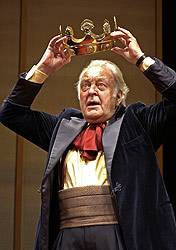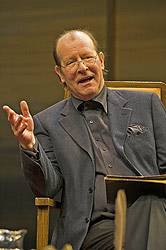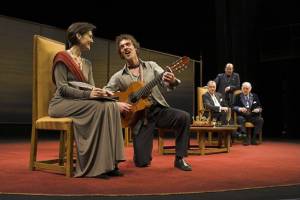Show Timeless and Full of Humour
Love child proves extra-marital affairs
sometimes work
|
As the programme makes clear, in an unashamed
piece of self-congratulation, The Hollow Crown is “an extraordinary
success story.” It is also a smart move when the Redgraves of this world
find themselves confined to the sickbay, and thereby give a wonderful
opportunity to a group of old stagers to spend a glorious couple of hours
together having fun trying to out-ham each other, and by so doing send everyone
home smiling. I’m not so sure the cancelled Hecuba would have had
the same heart warming effect I for one felt I needed on such a cold and
miserable night.
In many ways The Hollow Crown is the
love child of John Barton and Peter Hall and proof that a
theatrical extra-marital affair can sometimes work, creating a loveable sprog
that remains timeless and full of humour, even if it is 45 years old and still
living at home. |

|
This piece of theatrical hokum was first devised in
1960 when Peter Hall (the creator and first Artistic Director of the R.S.C.)
invited his old friend, the Eton and Cambridge educated John Barton, to join
him in Stratford as his Associate Director. It was part of Barton’s brief
at the R.S.C. to pay special attention to verse speaking, and legend has it
that he devised The Hollow Crown - which is no more than an anthology of words
and music about the kings and queens of England - for the new intake of R.S.C.
actors to explore the differences in style between, for instance, the novelist
William Makepeace Thackeray, our old friend William Shakespeare,
the very dour James I, and that first hippie, Sir Thomas Malory,
plus a teenage Jane Austen with a crush on Mary Queen of Scots.
On the principle that you can’t keep a good idea secret it also became the
hit of that year’s Stratford Poetry Festival which has, since that time,
become a rather sombre, and boring affair.
Tell me, why are poetry festivals so bloody awful?
Answers on a postcard please to the editor of any small poetry magazine that
still takes itself seriously.
Where was I? Oh, yes. The love child then made its
way to the Aldwych Theatre in London where, on the evening of Sunday March 19th
1961, the original cast of Dorothy Tutin, Max Adrian, Richard
Johnson, and John Barton himself, ensured The Hollow Crown became part of
the very fabric of the R.S.C. Over the years the show has toured theatres,
schools, and colleges all over the world. If you’ve never seen it, hang
around and it’ll come your way eventually.
|

|
I have to say that on Thursday night I
wasn’t too sure what to expect, never having seen the show before, but as
soon as Alan Howard, Harriet Walter, Richard Johnson,
singer and guitarist, Stephen Gray, and, of course, Sir Donald
Sinden, looking every inch the Edwardian actor/manager (in his blue smoking
jacket and silver cummerbund), strolled on stage, I knew I was in wonderful,
and eccentric, company.
There was some initial hesitation on the part
of the audiences as to whether or not we should applaud each piece - and I have
to admit to not applauding at the beginning just in case that damned Austrian
woman with the lethal finger was behind me again - but eventually we all began
to relax, especially when Sir Donald lost his place (much to the amusement of
his fellow thespians) with only the man’s superb comic timing, and
wonderfully fruity voice, coming to his rescue. |
From then on things became more relaxed for both the
audience, and the performers, even to the extent that a rather cross looking
reviewer, with a long red scarf worn in the Dr Who fashion, began to
laugh so much he forgot to write anything in his open notebook. And please,
when did you last see a reviewer with an open notebook, and fountain pen? About
1932?
Whenever the 82 year old Sir Donald, or the 78 year
old Richard Johnson (wearing a Texas style bootlace tie with a silver clasp),
or Alan Howard (who looks more and more like an ageing Methodist minister these
days) were speaking the whole thing took on a wonderful feeling of aged
forgetfulness that was in no way disconcerting, but strangely comforting when
you realised it was as a result of an inner confidence born out of decades of
treading the boards, and that these old troupers were going to stretch every
syllable, and every word, for all it was worth. It was exhibition stuff, and a
privilege to see and hear.
Harriet Walter is, at 54, and in theatrical terms,
very much an old trouper herself, and absolutely stunning to the eye, with a
voice that can slice chunks out of a mans heart at a hundred yards (sorry, 91
metres), and she was a superb, and at times rather flirty counter-point to the
elderly gents who were obviously in love with her. Her joyous, and very funny,
reading of the fifteen year old Jane Austin’s “Partial, Prejudiced
and Ignorant History of England” was a delight. In contrast, her rendition
of the fiery speech made by Mary Tudor, denouncing the rebellion of Sir Thomas
Wyatt, was wholly believable, and spine tingling, as was her reading of the
very moving, pleading, proud, and hugely respectful letter, written by Anne
Boleyn to Henry VIII, a few days before her execution:
Sir: Your Grace’s
displeasure, and my imprisonment are things so strange unto me, as what to
write or what to Excuse, I am altogether ignorant; whereas you sent unto me
(willing me to confess a truth, and so obtain your favours) by such as one whom
you know to be my ancient and professed Enemy; I no sooner received the
Message; and if, as you say, confessing Truth indeed may procure my safety, I
shall with all willingness and Duty perform your command.
But let not your Grace ever
imagine that your poor wife will ever be brought to acknowledge a Fault, where
not so much as thought thereof proceeded. And to speak a truth, never Prince
had Wife more loyal in all Duty, and in all true Affection, than you have found
in Anne Boleyn, with which name and place could willingly have contented my
self, as if God, and your Grace’s Pleasure had been so pleased.
Try me, good King, but let me have
a lawful trial, and let me receive an open trial, for my Truth shall fear no
open shame; then shall you see either mine innocently cleared, your Suspicion
and Conscience Satisfied, the Ignominy and Slander of the World stopped, or my
Guilt openly declared.
My last and only request shall be
that my self may only bear the Burden of your Grace’s Displeasure, and
that it may not touch the innocent Souls of those poor Gentlemen, who (as I
understand) are likewise in straight Imprisonment for my sake….
|
The above gave Sir Donald (as Henry VIII) a
wonderful opportunity to indulge in some outrageous face acting, that suggested
all too clearly he knew those “ innocent Souls” had already been
executed.
I have to say I was rather disappointed we
didn’t hear anything from Oliver Cromwell (“King in all but
name…”), with the one piece where Charles I (Richard Johnson), and
John Bradshaw (Alan Howard*) make angry exchanges during the King’s trial
hardly sufficient to even suggest there had been a Lord Protector in this
country. |

|
I think we can guess from that omission where John
Barton stands with regard monarchy vs. republicanism, but then, if you are a
founder member of the Royal Shakespeare Company, can you blame him for the
omission?
The ruggedly handsome singer, and guitarist, Stephen
Gray, added a delightful dimension to the evening with a voice that had a hint
of the heavy smoker about it, which he backed-up with some superb playing on
both six and twelve string guitars. And his relatively young age must also have
reduced the collective decade tally by at least a third.
During the evening my partner, Julia, confessed that
she fell under the spell of Richard Johnson after seeing him in the film
Captain Horatio Hornblower back in 1951, and that she still lusts after him. I
guess we all have our crosses to bear.
RATING: *****
© 2005, Steve Newman
The Boards, Volume III, Issue 10, 10.3.05.
www.theboards
|
* Donald Sinden did John
Bradshaw on the evening I was there. |
Back |


